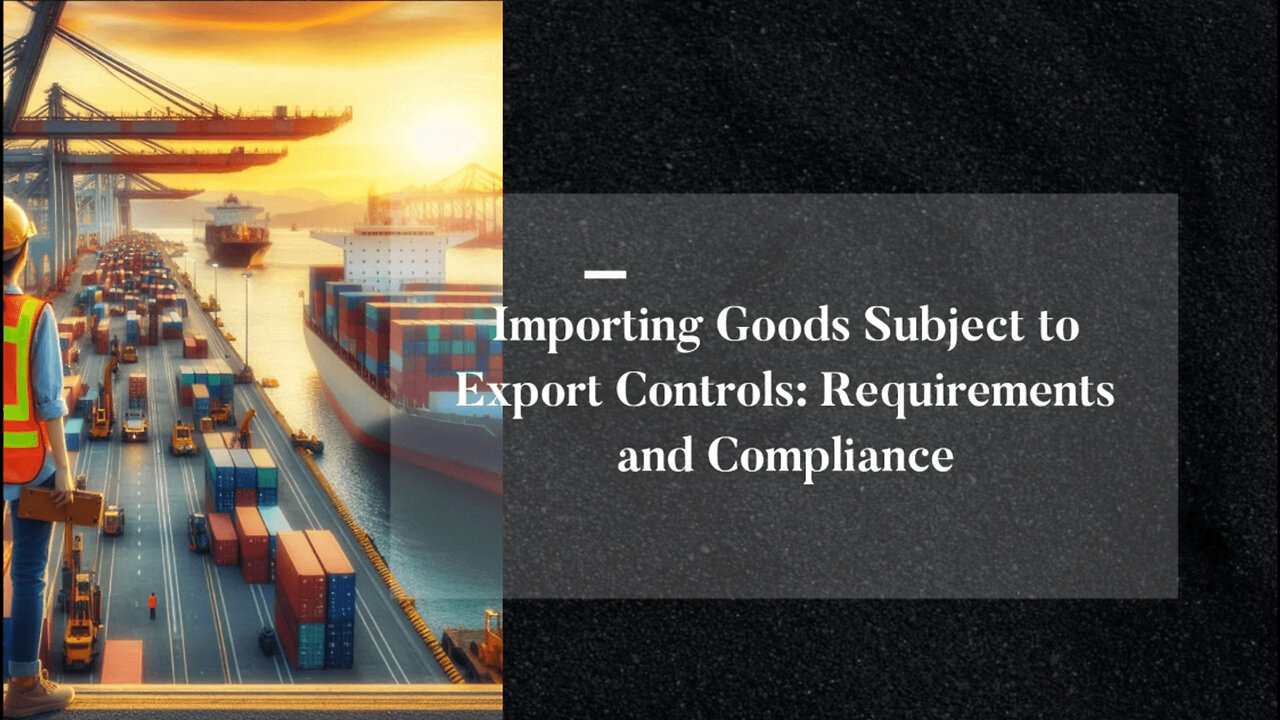Premium Only Content

The Essential Guide to Importing Goods Subject to Export Controls
ISF Solution | (832-904-9333)
clearance@isfsolution.com | www.isfsolution.com
In today's video, we discussed the requirements for importing goods that are subject to export controls. Importing such goods involves regulations and procedures that must be followed to ensure compliance. A customs broker plays an essential role in assisting importers with navigating through these complexities and ensuring smooth customs clearance.
The Importer Security Filing (ISF), also known as the 10+2 rule, is a key requirement for importing goods subject to export controls. The ISF consists of 10 data elements provided by the importer and 2 additional data elements provided by the carrier. It must be filed at least 24 hours prior to the vessel's departure and includes crucial information such as the shipper's and consignee's details, commodity HTSUS code, and container stuffing location. Accuracy and timeliness in filing the ISF are crucial to avoid penalties and delays.
Obtaining a customs bond is another requirement for importing goods subject to export controls. A customs bond serves as a financial guarantee for the payment of customs duties, taxes, and other fees related to the importation of goods. It can be a single-entry bond for one-time imports or a continuous bond for frequent importers. Importers can obtain a customs bond from a licensed customs broker or a surety company.
Importers must also comply with any additional licensing requirements or restrictions imposed on the goods being imported. This may involve obtaining licenses or permits from federal agencies such as the Bureau of Industry and Security (BIS) or the Directorate of Defense Trade Controls (DDTC).
To maintain compliance with export control regulations, importers should have a well-developed compliance program. This program should include conducting thorough due diligence on suppliers and understanding the export control classification of the goods being imported.
In conclusion, importing goods subject to export controls requires adherence to several requirements, including filing an ISF, obtaining a customs bond, and complying with licensing requirements. Working closely with a customs broker is vital for importers to receive expert guidance and support throughout the import process.
#usimportbond #isfcustomsbroker #uscustomsclearing #isfentry
Video Disclaimer Here: For educational purposes - No affiliation with US government sectors.
00:23 Customs Broker Role
00:44 Importer Security Filing (ISF)
01:29 Customs Bond Requirement
02:27 Compliance and Licensing
-
 LIVE
LIVE
Major League Fishing
1 day agoLIVE! - Bass Pro Tour: Stage 3 - Day 1
286 watching -
 1:07:36
1:07:36
Russell Brand
4 hours agoTariff War Begins: Trudeau Threatens Retaliation Against Trump – SF549
83.6K65 -
 DVR
DVR
vivafrei
3 hours agoGuest "Misfit Patriot" on Andrew Tate & Casey Anthony! Canada Goes Full Trade War! ACB = DEI?
47.2K18 -
 1:58:22
1:58:22
The Charlie Kirk Show
3 hours agoCharlie vs. Gavin Newsom | Jonathan "Lomez" Keeperman | 3.6.25
90K24 -
 1:15:59
1:15:59
Simply Bitcoin
3 hours ago $1.04 earnedCould The NEXT 24 Hours Change The 2025 Bitcoin Bull Market? | EP 1197
20.8K3 -
 49:57
49:57
The Dan Bongino Show
5 hours agoAnother Phony Narrative Crumbles + First Show In The New Studio! (Ep. 2437) - 03/06/2025
724K1.91K -
 44:26
44:26
The Rubin Report
4 hours ago'Real Time' Crowd Stunned by Bill Maher’s Unexpected Glaring Blind Spot
71.6K39 -
 1:45:31
1:45:31
Benny Johnson
4 hours agoDeep State PURGE: CIA Agents STRIPPED of Badges as Trump DISMANTLES Dept of Education | Dem CENSURED
107K117 -
 55:56
55:56
Grant Stinchfield
3 hours ago $2.05 earnedWhat Happened to the Mystery Drones? They Don't Just Disappear, or do They?
41.2K4 -
 1:17:41
1:17:41
Flyover Conservatives
14 hours agoThe Medical Industry’s Dark Secret—What They Don’t Want Pregnant Women to Know! - Dr. James Thorp | FOC Show
45.7K1